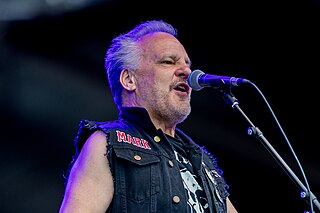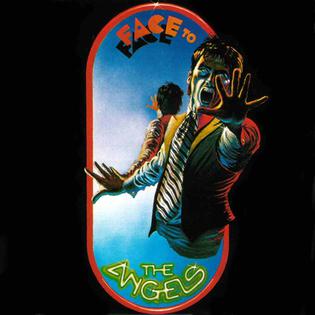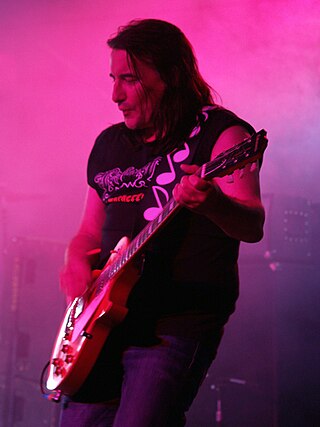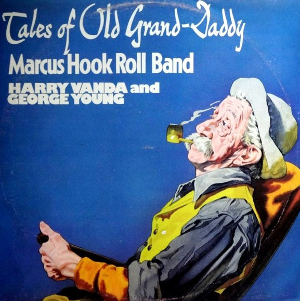Related Research Articles

AC/DC are an Australian rock band formed in 1973. They were founded by brothers Malcolm Young on rhythm guitar and Angus Young on lead guitar. Their current line-up comprises Angus, bass guitarist Cliff Williams, drummer Phil Rudd, lead vocalist Brian Johnson and rhythm guitarist Stevie Young, nephew of Angus and Malcolm. Their music has been variously described as hard rock, blues rock and heavy metal, but the band calls it simply "rock and roll". They are cited as a formative influence on the new wave of British heavy metal bands, such as Def Leppard and Saxon. AC/DC were inducted into the Rock and Roll Hall of Fame in 2003.

Clifford Williams is an English musician, best known as the bassist and backing vocalist of the Australian hard rock band AC/DC. He started his professional music career in 1967 and had previously been in the English groups Home and Bandit. His first studio album with AC/DC was Powerage in 1978. Williams was inducted into the American Rock and Roll Hall of Fame as a member of AC/DC in 2003. Williams announced his retirement from AC/DC in 2016, but returned for their 2020 comeback album Power Up along with band mates Brian Johnson and Phil Rudd. His side projects include benefit concerts.

George Redburn Young was an Australian musician, songwriter and record producer. He was a founding member of the bands The Easybeats and Flash and the Pan, and was one-half of the songwriting and production duo Vanda & Young with his long-time musical collaborator Harry Vanda, with whom he co-wrote the international hits "Friday on My Mind" and "Love Is in the Air", the latter recorded by John Paul Young.

Mark Whitmore Evans is an Australian musician, the current bass guitarist for rock band Rose Tattoo, and also a member of hard rock band AC/DC from March 1975 to June 1977. His playing featured on their albums T.N.T, High Voltage, Dirty Deeds Done Dirt Cheap and Let There Be Rock. Evans has played for numerous other groups, sometimes on lead guitar, including Finch, Cheetah, Swanee, Heaven and The Party Boys. Evans' autobiography, Dirty Deeds: My Life Inside/Outside of AC/DC was released in December 2011.

The Angels is the first album by Australian hard rock band, The Angels, which was released in August 1977. It was produced by Vanda & Young at Sydney's Albert Studios. It included a re-recorded version of their debut single, "Am I Ever Gonna See Your Face Again" and provided their second single, "You're a Lady Now", in July 1977. By the mid-1980s "Am I Ever Gonna See Your Face Again" had developed a cult status with the audience responding with "No way, get fucked, fuck off!"

Face to Face is the second studio album by Australian hard rock band, the Angels, which was released in June 1978. It was co-produced by the band with Mark Opitz, which peaked at No. 18 on the Kent Music Report Albums Chart. For shipment of 280,000 copies, it was accredited as 4× platinum.
Peter William "Pete" Wells was the founder and slide guitarist in Australian hard rock band, Rose Tattoo, from 1976 to 1983. He was previously bass guitarist with the pioneering heavy metal outfit Buffalo from 1971 to 1976. Wells also had a solo career and issued albums, Everything You Like Tries to Kill You (1991), The Meaning of Life (1992), No Hard Feelings (1993), Orphans (1994), Go Ahead, Call the Cops (1996), It's All Fun and Games 'till Somebody Gets Hurt (1999), Hateball (2000) and Solo (2002). In 2002, he was diagnosed with advanced prostate cancer and, on 27 March 2006, Wells died of the disease, aged 59. Rose Tattoo were inducted into the Australian Recording Industry Association (ARIA) Hall of Fame on 16 August of that same year.
Buffalo was an Australian rock band formed in August 1971 by founding mainstay Dave Tice on lead vocals (ex-Head). Fellow founders, also from Head, were Paul Balbi on drums, John Baxter on guitar, and Peter Wells on bass guitar; together with Alan Milano on lead vocals (ex-Mandala). Milano left after their debut album, Dead Forever..., and Balbi was replaced on drums by Jimmy Economou. Their next two albums, Volcanic Rock and Only Want You for Your Body, were also issued by Vertigo Records. After 1975 line-up changes resulted in a more commercial sound and the group disbanded in March 1977. Australian musicologist Ian McFarlane noted that there was "nothing subtle about Buffalo's primal, heavyweight sound, but it was delivered with a great deal of conviction ... combining the dense, heavy riffing ... with the progressive blues chops ... the band certainly captured the arrogant disposition of the times in a bold and thunderous fashion". Alongside Billy Thorpe & The Aztecs and Blackfeather, Buffalo pioneered Australia's heavy metal, pub rock and psychedelic rock movements. Peter Wells died on 27 March 2006, aged 58.

Larry Van Kriedt is an American-born Australian jazz musician. He is best known for being the original bassist for the rock band AC/DC around November 1973, joining Malcolm Young, Angus Young, Dave Evans and Colin Burgess (drums). He was replaced in February 1974. Van Kriedt also plays saxophone, guitar and sings.

Colin John Burgess was an Australian rock musician who was the drummer in the Masters Apprentices from 1968 to 1972. He was later the original drummer with hard rock band AC/DC from November 1973 to February 1974. The Masters Apprentices had top 20 singles chart success with "5:10 Man", "Think about Tomorrow Today", "Turn Up Your Radio" and "Because I Love You".
Peter Clack is an Australian drummer – for ten months he was an early member of hard rock band AC/DC. In April 1974 he joined Malcolm Young, Angus Young, Dave Evans and Rob Bailey. He appears in early video footage of AC/DC, the Last Picture Show Theatre video of "Can I Sit Next to You Girl". Clack was a member of the band during the recording of their debut album High Voltage but most of the drum parts were recorded by session man Tony Currenti. Clack continued with AC/DC until January 1975 when he was sacked along with Bailey, Clack's permanent replacement was Phil Rudd.

"Can I Sit Next to You, Girl" is the debut single by Australian hard rock band AC/DC, issued on 22 July 1974. On 26 August 1974, the song peaked at number 50 in Australia. This version has lead vocals performed by Dave Evans prior to his being replaced by Bon Scott, as well as drums by ex-Masters Apprentices member Colin Burgess, and bass guitar by ex-The Easybeats member George Young. Originally, AC/DC's first bassist, Larry Van Kriedt, played the bass parts, but George recorded his own over them later. In 1975, after Scott joined, the group re-arranged and re-recorded the song as the seventh track on their Australia-only album T.N.T., released in December 1975, and as the sixth track on the international version of High Voltage, released in May 1976. The title of this version of the song removed the comma, becoming "Can I Sit Next To You Girl".
Cheetah were an Australian hard rock band, active between 1976 and 1984.
Rabbit were an Australian glam rock band from Newcastle, which formed in 1973 by Jim Porteus on bass guitar, Phil Screen on drums and Mark Tinson on guitar and vocals. In October 1974 they were joined by Dave Evans (ex-AC/DC) on lead vocals. The group relocated to Sydney and released two albums, Rabbit (1975) and Too Much Rock n Roll (1976), before disbanding in late 1977. Porteus, Screen and Tinson returned to Newcastle where they formed a hard rock band, Heroes, with Peter de Jong on guitar and vocals. They issued a self-titled album in October 1980 and disbanded in 1982.

Michael Thomas Cocks, known professionally as Mick Cocks, was an Australian musician, most noted for his guitar and songwriting work with Rose Tattoo. His original sound and style heavily influenced Guns N' Roses, who recorded a cover of the Rose Tattoo song "Nice Boys". He was also a member of Heaven, The Headhunters, Illustrated Men, Doomfoxx, Pete Wells' Heart Attack, and the Ted Mulry Gang. On 16 August 2006, Rose Tattoo were inducted into the Australian Recording Industry Association (ARIA) Hall of Fame.

High Voltage is the debut studio album by Australian hard rock band AC/DC, released only in Australia and New Zealand, on 17 February 1975. Their first international release in 1976 would also be named High Voltage, though with a radically different track list.
Marcus Hook Roll Band were a rock group formed in London in 1972, by Harry Vanda and George Young as a session band to record their songwriting efforts. The group had two versions from London and Sydney – formed in mid-1973, when Vanda and Young returned to Australia. They issued three singles – "Natural Man" (1972), "Louisiana Lady" (1973) and "Can't Stand the Heat" (1974) – and one album – Tales of Old Grand-Daddy (1974). It is noted for featuring Malcolm and Angus Young prior to forming AC/DC.

Tales of Old Grand-Daddy is the only studio album by Australian rock band Marcus Hook Roll Band, released in Australia in March 1974. The album is noted for being the recording debut of future AC/DC founders Angus Young and Malcolm Young.
Buster Brown was an Australian rock band, which featured vocalist Angry Anderson and drummer Phil Rudd, that was formed in Melbourne in 1973. Their sound was hard rock mixed with blues rock influences. Their first album, Something to Say was produced by Lobby Loyde and released in 1974. Rudd left to join an early version of AC/DC while Anderson continued with new line-ups and eventually disbanded the group in November 1975. Anderson joined Rose Tattoo which later included former Buster Brown bandmates, Geordie Leach on bass guitar and Dallas "Digger" Royall on drums.
References
- General
- "Two Sides to Every Glory", Paul Stenning, 2005
- "Metal Hammer & Classic Rock present AC/DC", Metal Hammer magazine special, 2005
- McFarlane, Ian (1999). "Whammo Homepage". Encyclopedia of Australian Rock and Pop . St Leonards, NSW: Allen & Unwin. ISBN 1865080721. Archived from the original on 5 April 2004. Retrieved 31 July 2011. Note: Archived [on-line] copy has limited functionality.
- Specific
- ↑ Kimball, Duncan (2002). "Flake". Milesago: Australasian Music and Popular Culture 1964–1975. Ice Productions. Retrieved 20 April 2010.
- 1 2 3 McFarlane, 'AC/DC' entry. Archived from the original on 6 August 2004. Retrieved 26 March 2012.
- ↑ Holmgren, Magnus. "AC/DC". Australian Rock Database. Passagen (Magnus Holmgren). Archived from the original on 25 October 2000. Retrieved 26 March 2012.
- ↑ Walker, Clinton (2001). Highway to Hell: The Life and Times of AC/DC Legend Bon Scott. London: Turnaround. ISBN 1-891-24113-3.
- ↑ Engleheart, Murray; Durieux, Arnaud (2006). AC/DC: Maximum Rock N Roll. Pymble, NSW: HarperCollins. pp. 92–93. ISBN 0-7322-8383-3.